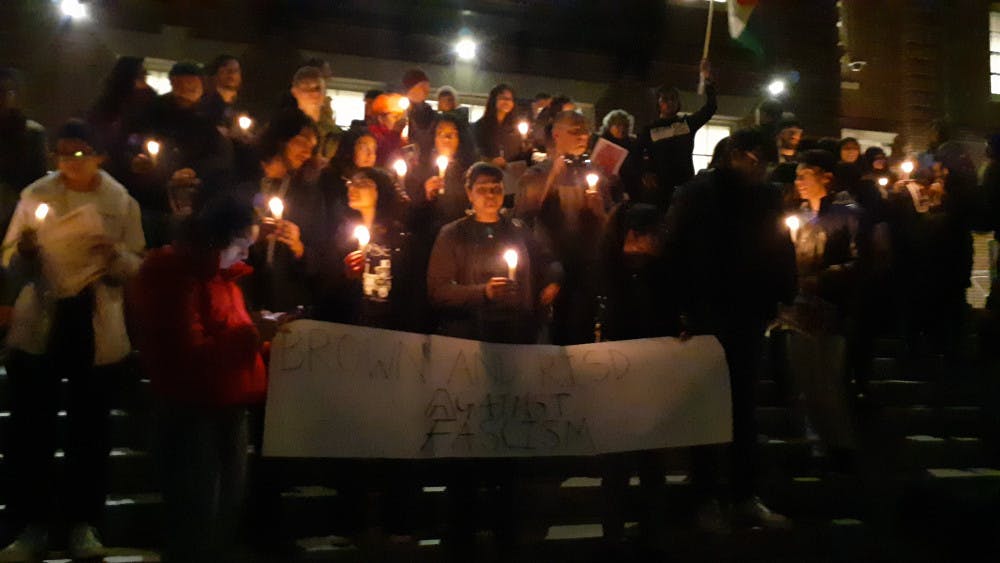Thursday evening, Providence residents and University students and faculty gathered on the steps of the Stephen Robert ’62 Campus Center to take part in the “Holi Against Hindutva” demonstrations, joining other colleges and universities that demonstrated nationwide.
Holi, a widely-celebrated Hindu festival, welcomes the transition from winter to spring and acts as a thanksgiving for a good harvest. But “the festival is also associated with the oppression of certain minorities in India, such as Muslims,” said Anchita Dasgupta ’21, one of the event’s organizers. “Today we are not celebrating Holi, but mourning it. This is why instead of wearing bright colors (a custom typical of Holi) we will be dressed in black at the protest,” she added. This mourning is a response to the recent violence in Delhi, India, in which at least 42 were killed and hundreds injured.
The demonstration, “Protest Against Anti-Muslim Violence in India and the CAA” began with the lighting of candles. “It’s truly heartening to see everyone come out here,” said Rhythm Rastogi ’22. “Today we stand in solidarity with the victims and with the nationwide Holi Against Hindutva movement. Right now as we demonstrate here, there are 25 other campuses also demonstrating,” she added.
Rastogi went on to discuss the “damaging anti-Muslim rhetoric” put forth by the Indian government, including the Citizenship Amendment Act, which draws a path to citizenship for religious-minority refugees from Muslim-majority countries. The act has been criticized as anti-Muslim and has been met with protests around the globe. In India, violent riots, such as the recent one in Delhi, have frequently confronted these protests.
The demonstration therefore included a moment of silence for the victims in Delhi, after which Rastogi invited the attendees of the protest to “share their stories and a few words of love and hope.”
Associate Professor of History Vazira F-Y Zamindar and Assistant Professor of Anthropology Bhrigupati Singh spoke at the protest, emphasizing the long-term impact of the Muslim-Hindu partition in India and its global relevance. “I think I inherited this generational trauma of partition,” Zamindar said. “I wanted to ask all of us to think about ways (in) which we need to begin unlearning partition.” She went on to discuss how partition impacts India today. “We cannot live together. … It makes the Muslim difference an incommensurate difference.” This difference, she added, “invokes violent hostility,” such as that seen recently in Delhi.
“On my way here my daughter asked me what the purpose of this protest was. ... How can we help when we are here, and they are in India?” Singh said. “But in the winter when I went back to Delhi, (I saw) how much it matters. One of the first things they told me was, ‘Oh people do care. There’s a protest all the way in Boston!’” he added.
“It’s really important for universities in the United States to show solidarity with India because Indian media outlets pay a lot of attention to how the government is perceived internationally,” said Aryan Srivastava ’22, another organizer of the event. “Every protest matters,” Singh added.
“I was born in 1947, the year India got its independence,” said Nashad Siddiqui, an attendee of the protest, speaking to India’s history. “Back then, Hindus, Muslims, all people — we were all united because we were so happy to have thrown the British out of the country. We never had any kind of hostility against each other,” she added. “This is such a surprise to me that this kind of thing is happening in India. … It tears my heart apart because I loved my country, India, and I love my country, the United States, for giving me the freedom of speech and safety that was once (but is no longer) possible for me in India.”
Others followed Siddiqui, telling stories, reading poems and offering their perspectives and condolences. “I have been very critical of this government since it came to power,” said Kushagra Agarwal ’22, an international student from India. “I used to be the person to share three posts against this government on my social media every day.” But recently, Agarwal explained that he has been doing this less. “The reason behind that is the reign of terror that this government has instituted. They are taking away (the citizenship) of journalists who are critical of them. … They are doing everything in their power to ensure that there is no opposition.”
Agarwal added that he had a ritual of “cleansing his social media” before returning home. “I was scared of being stopped at the airport and being denied entry into my own nation. I was scared of my citizenship being taken away.” He went on to acknowledge his relative privilege as a “Hindu Indian citizen who is studying abroad in the United States.” Yet he is “still fearful to post something on social media. … I can’t even imagine the courage it takes to go out and protest in the streets in India,” he added. “So if you have the courage, … please talk to the people around you and post on social media. If there is any way to go against fascism, it is by creating a larger movement.”





